Thursday, January 31, 2008
Same Song, Different Verse
I guess there are two ways to take the opposing beliefs of the invasive cardiologist versus the noninvasive cardiologist. They can't both be right, in every instance. The noninvasive, noninterventionalist cardiologist wouldn't think of performing a coronary artery bypass graft (CABG) on a patient as a first resort any more than he would believe the best treatment for athlete's foot is to amputate the patient's leg at the ankle. Oh, the surgical amputation certainly would result in the elimination of the fungal infection, but at what cost to the patient.
So, I wasn't the least bit surprised when the cardiologist who performed my most recent cardiac catheterization concluded that the angiogram showed I needed a CABG. I would have been more shocked if he suggested the medical treatment I had been undergoing since the spring of 2004 and the Enhanced External Compression Pulsation (EECP) Therapy I took last fall had actually made the most popular cardiac surgery performed in the USA unnecessary, or at the very least, premature.
The first angiogram, performed in 2004, showed I had a 100 percent blockage in two arteries and 85 percent occlusions in three more. The cardiologist who performed that procedure four years ago, adamantly insisted a stroke or heart attack was imminent unless I had an immediate Quintuple CABG performed. He seemed personally insulted by my declaration that I was going to seek a second opinion, making the rash statement, "You are a time bomb waiting to explode." But that obvious attempt to coerce me into consenting to have my chest cracked open didn't work. I stubbornly (some would say stupidly) obtained a second opinion and even had the gall to take the medical advice of the cardiologist who provided that second opinion by choosing his more prudent medication regimen.
Today I underwent a second angiogram. I had hoped it would definitively demonstrate that my decision to opt for a nonsurgical alternative to a CABG was the correct one. It did not. However, the cardiologist at the Indiana Heart Hospital who performed the cardiac catheterization today did say some thing very similar to the doctor who performed the one four years ago. He said, "Your pump is in great shape."
That declaration alone was enough to tell me I chose the proper course in 2004. The cardiologist today said something else that was very telling. He said, "There is at least a trickle of blood going through each of your arteries." Now he said this in response to my question as to why the heart in such great shape if the arteries that feed it oxygen suck. He could have said, "The collateral vessels must be supplying the heart with oxygen." He did not. He specifically attributed the pump's great shape to the small amount of blood still being pumped through my arteries.
The cardiologist today also gave me some good news. He said the angiogram showed the left ventricular artery was not comprimised. That vessel, morbidly known as the "widow-maker" is the one artery that its occlusiion would warrant an immediate CABG.
I have an appointment to see my cardiologist on Monday, next. At that time, I plan on looking at the results of both angiograms I have undergone and the echocardiogram that was performed on Monday. Unless he provides me with a very compelling reason to undergo a CABG, I will continue the treatment of my coronary artery disease as I feel Dr. Howard Wayne would have.
I will report back to the readers of this blog on Monday February 4. In the meantime, I am soliciting the opinions and advice of all who read this blog. What do you think I should do? If it was your decision to make, how would you go about making it? Please provide your comments as soon as possible. See you next week.
So, I wasn't the least bit surprised when the cardiologist who performed my most recent cardiac catheterization concluded that the angiogram showed I needed a CABG. I would have been more shocked if he suggested the medical treatment I had been undergoing since the spring of 2004 and the Enhanced External Compression Pulsation (EECP) Therapy I took last fall had actually made the most popular cardiac surgery performed in the USA unnecessary, or at the very least, premature.
The first angiogram, performed in 2004, showed I had a 100 percent blockage in two arteries and 85 percent occlusions in three more. The cardiologist who performed that procedure four years ago, adamantly insisted a stroke or heart attack was imminent unless I had an immediate Quintuple CABG performed. He seemed personally insulted by my declaration that I was going to seek a second opinion, making the rash statement, "You are a time bomb waiting to explode." But that obvious attempt to coerce me into consenting to have my chest cracked open didn't work. I stubbornly (some would say stupidly) obtained a second opinion and even had the gall to take the medical advice of the cardiologist who provided that second opinion by choosing his more prudent medication regimen.
Today I underwent a second angiogram. I had hoped it would definitively demonstrate that my decision to opt for a nonsurgical alternative to a CABG was the correct one. It did not. However, the cardiologist at the Indiana Heart Hospital who performed the cardiac catheterization today did say some thing very similar to the doctor who performed the one four years ago. He said, "Your pump is in great shape."
That declaration alone was enough to tell me I chose the proper course in 2004. The cardiologist today said something else that was very telling. He said, "There is at least a trickle of blood going through each of your arteries." Now he said this in response to my question as to why the heart in such great shape if the arteries that feed it oxygen suck. He could have said, "The collateral vessels must be supplying the heart with oxygen." He did not. He specifically attributed the pump's great shape to the small amount of blood still being pumped through my arteries.
The cardiologist today also gave me some good news. He said the angiogram showed the left ventricular artery was not comprimised. That vessel, morbidly known as the "widow-maker" is the one artery that its occlusiion would warrant an immediate CABG.
I have an appointment to see my cardiologist on Monday, next. At that time, I plan on looking at the results of both angiograms I have undergone and the echocardiogram that was performed on Monday. Unless he provides me with a very compelling reason to undergo a CABG, I will continue the treatment of my coronary artery disease as I feel Dr. Howard Wayne would have.
I will report back to the readers of this blog on Monday February 4. In the meantime, I am soliciting the opinions and advice of all who read this blog. What do you think I should do? If it was your decision to make, how would you go about making it? Please provide your comments as soon as possible. See you next week.
Subscribe to:
Post Comments (Atom)



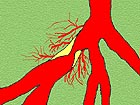
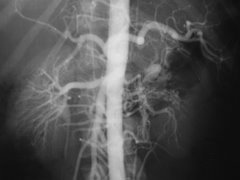
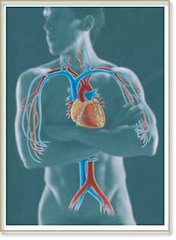
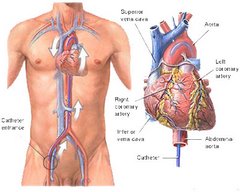
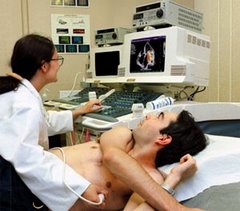
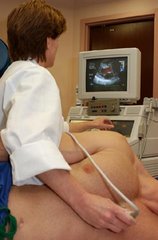
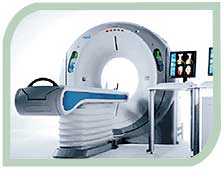
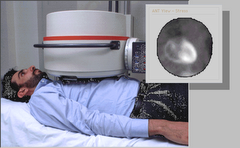
3 comments:
The problem with doing a bypass is that the heart will never again contract in the same synchronous way following surgery as it does today. The bypass damages the septum of the heart and it is the equivalent of having
a myocardial infarction of the septum. On echos the reduced motion of the septum will often be referred to as "typical post CABG septum". In other words, the septum is damaged by the bypass surgery. Just because they put in several bypass grafts doesn't
guarantee that the blood will get downstream if the vessels can't handle the more abundant blood supply (sort of like flooding a small stream). Furthermore, the grafts may interfere or damage the existing blood supply to the collateral vessels and the grafts may close off in a few days, weeks, or months. In the end, although you may end up with open grafts for a period of time, you may have less contraction and less of a blood supply due to all the damage that is done by the surgery.
Dear Jeff,
I’m glad your angiogram had a good result and that your heart continues to be in great condition.
I don’t have CAD (at least that I know ;) ), so I asked my husband what he would do in your case.
I think you know what he said.
His condition is very similar to yours. He is about the same age, has two arteries 100% blocked, no heart attacks, ejection fraction ok, heart in good shape and very few symptoms.
I asked him to tell me a few reasons why he wouldn’t get CABG done and he mentioned just a few:
• It’s a dangerous surgery itself with lots of complications.
• There’s no scientific evidence that CABG offer any benefit in quality of life, preventing future heart attacks or improving life span.
• Many studies show that chances of survival are higher adopting a conservative approach.
• Results (if any) last from a few months to 15 years at most.
• My heart is in very good shape, that would probably not be the same after CABG.
• When his doctor told him they had been doing the same surgery for more than 50 years he understood why some doctors say it is an obsolete procedure.
• He trusted Dr. Wayne when he told us that none of his more than 400 patients (most of them with worse CAD conditions) has had a heart attack since 1995.
It’s true that Dr. Wayne opened our eyes to this reality, but he wasn´t the only source we had. We (as you and many of his patients) did not follow him blindly. We read many more studies (besides those in Dr. Wayne’s website) performed by top level hospitals and institutions around the world, that confirmed he was right.
My best wishes and prayers to you.
Maria
Mexico City.
PS.- My husband also asked me to tell you that this is a decision only you can make, and that he is only offering his point of view and what he would do if he were in your situation right now.
This reminds me what Dr. Wayne told him in our first visit: “I’m not going to tell you, you are not going to die. I can’t guarantee anything. But most evidence shows you made the right decision rejecting Bypass surgery.”
Please forgive my English.
Maria, your English was terrific and I certainly appreciate the input o both you and your husband. I have not been convinced to get the CABG by any means. In fact, if anything, I lean toward adding Isordil to the medications I already am on and starting the diuretic again. My family doctor told me to stop the moduretic when I had some slightly elevated liver studies.
Like you, I appreciate Dr. Wayne immensely. If I had not gotten a second opinion from this man and had surgery instead of the treatment with medications he offered, I would never had been able to return to work when I did in 2004.
I have challenged invasive and interventional cardiologists to prove that the bypass surgery is superior to treatment with medication. No one has been able to do that to my satisfaction.
Tell your husband to keep the faith and stick to his principles.
Post a Comment